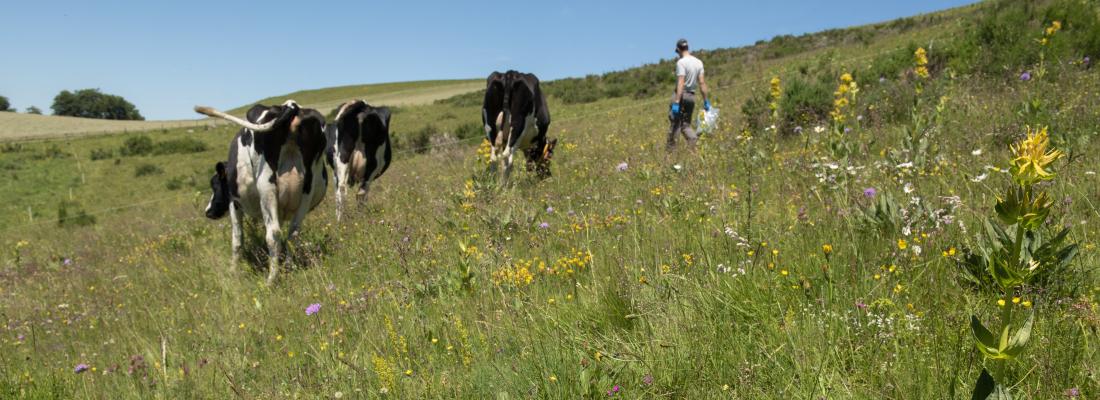Agroecology Reading time 7 min
Understanding how to scale out agroecology in livestock farming, based on five case studies
This study explores the barriers to the agro-ecological transition of livestock farming systems through five case studies in Switzerland, Guadeloupe, mainland France (Massif Central), Bulgaria and Spain (Andalusia). The results show the decisive importance of involving all the players in the sectors concerned.
Published on 22 May 2025

Agroecology is a promising way of reducing the negative environmental impact of livestock farming and designing ethically acceptable food systems. To date, most research has been carried out at herd, plot or farm level, without really taking into account the social dimensions of agroecology.
This article focuses on analysing how the 13 principles of agroecology defined by the HLPE (2019)* are mobilised in five different contexts: Switzerland, Guadeloupe, Massif Central, Bulgaria and Andalusia. The results consist of an analysis of the obstacles to transition, combining eight dimensions: public policy, markets, infrastructure, technology, cooperation networks, access to land, culture and equity.
The data was collected in three stages: (i) identification of practices based on the principles laid down by the HLPE, (ii) self-assessment of the importance of each principle according to whether they are considered structuring, important or more marginal by the case study pilots, and (iii) identification of the obstacles and levers to transition.
All 13 principles were applied in all the case studies, but with varying degrees of relative importance.
In Switzerland, the emphasis is on developing multi-species grassland mixtures that reduce inputs and preserve soil health and biodiversity. Collaboration between seed-producing companies, researchers and the farmers who test them in the field has enabled these mixtures to be certified and awarded a quality label. The cost of production is high, but the research and development effort is sustainable.
In Guadeloupe, diversified family micro-farms combine the cultivation of sugar cane and bananas, food crops and livestock (small ruminants, pigs and poultry) that make use of agricultural residues. This ‘Jardin Créole’ provides fresh produce for people on modest incomes and preserves agrobiodiversity, despite the obstacles posed by a lack of infrastructure and appropriate (small-scale) mechanisation.
The case of the Massif Central illustrates a citizen dairy model that combines expectations in terms of animal welfare with the preservation of biodiversity and emblematic landscapes, in an environment that is vulnerable to climate change. The grazing of calves is very popular with the public, but it does lead to a change in the colour of the meat (that is no longer white), which may act as a barrier on the development of this new sector.
In Bulgaria, the emphasis is on extensive livestock farming in an area of high environmental value, with local governance of access to communal pastures. The project provides for a system of payment for ecosystem services, but the absence of rules limiting stocking rate is threatening plant communities of heritage interest. Another major obstacle is the lack of local processing infrastructure (abattoirs, dairies).
In Andalusia, silvopastoral systems combine traditional livestock farming (Iberian pigs, sheep and goats) with chestnut and market gardening, as part of a strategy of economic diversification. The involvement of civil society in welcoming new farmers, building a slaughterhouse and consolidating local marketing channels reflects the priority given to the social principles of agro-ecology.
A comparative analysis of the obstacles to the development of these different agro-ecological systems highlights the need for appropriate infrastructure and the removal of certain technical barriers. To be effective, public policies must not only support sustainable production systems, but also act on the upstream and downstream sector. Structured collaboration networks and consumer interest in local products are opportunities to be seized. The success of the agro-ecological transition in livestock farming is therefore not limited to technical adjustments: it requires a systemic vision and a long-term commitment from all local players.
*High Level Panel of Experts, 2019. HLPE Report 2019-Agroecological and other innovative approaches, FAO, Rome, Italy. https://openknowledge.fao.org/server/api/core/bitstreams/ff385e60-0693-40fe-9a6b-79bbef05202c/content
Reference: Dumont, B.; Barlagne, C.; Cassart, P.; Duval, J.E.; Fanchone, A.; Gourdine, J.L.; Huguenin-Elie, O.; Kazakova, Y.; Klötzli, J.; Lüscher, A.; Oteros-Rozas, E.; Pomies, D.; Rivera Ferre, M.G.; Rossing, W.A.H.; Stefanova, V.; Swartebroeckx, A.; Zagaria, C., 2025. Principles, barriers and enablers to agroecological animal production systems: a qualitative approach based on five case studies. Animal, 19: Suppl.1, 101367 https://doi.org/10.1016/j.animal.2024.101367
